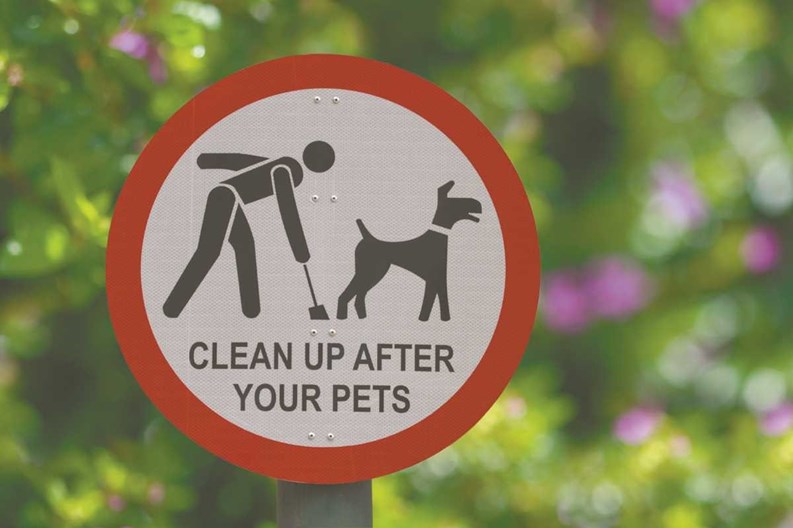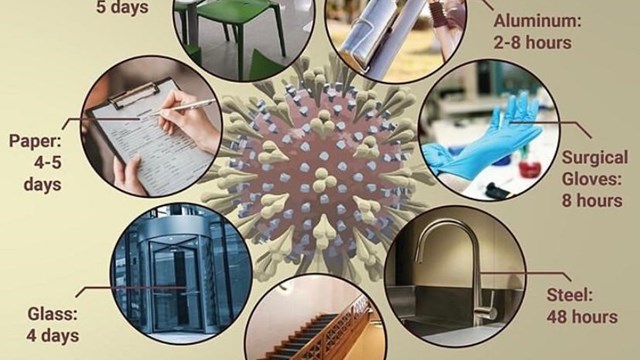The signs “Post No Bills,” “Active Driveway” and “Alternate Side Parking” are all fairly common and relatively self-explanatory in urban settings. Other equally common signs we see in suburban communities throughout the U.S. related to pets are: “Curb Your Dog,” “Please Clean Up After Your Dog,” or “All Pets Must Be on a Leash.”
Well, in New Jersey it all depends on the town you live in and sadly, while the ordinance that deals with picking up after your pet varies little from neighborhood to neighborhood, the signage and cleanliness of the sidewalks certainly can and do vary. This variance in pet waste has to do with a few factors: The number of dog-friendly buildings in one area, proximity to green spaces and dog runs, and the all-important “responsibility quotient” of dog owners in the community. All it takes is for a few individuals to start the downward spiral of pet owners not picking up after their pets and it becomes a messy problem, so to speak, creating a rift between those who love animals and those who don’t.
While it may be hard for dog lovers to believe there are people out there who are either indifferent to or even have a dislike for dogs, it's important to respect the fact that they do indeed exist and as such, try to respect them while taking their dogs for a stroll or to do their “business” outing.
Former board member at Stonegate at Watchung Fred Marks says pet waste was a major topic at every board meeting. “We were always trying to find a solution for residents that didn’t pick up after their dogs,” says Marks. “We put warnings in the monthly minutes letter stating that any residents caught not picking up after their dog would be subject to a $25 dollar fine. It didn’t work. We sent certified letters to dog owners asking them to pick up after their dogs. Nothing worked. To this day, we still have not found a solution.”
The Scoop
According to Daniel Emmer, communications manager for the New Jersey State Department of Health, there are approximately two million dogs in the state. When responsible owners take their dogs out to do their business, it’s a fairly routine process. Start with “curbing your dog.” This generally means bringing your dog to the curb to do their business. It’s a wonderful sentiment and actually works fairly often, but it is not foolproof. When curbing is not an option the next best thing is to (at least) guide them to a spot that is as out of the way as possible and hopefully they will do their “thing” there.
Dogs, however, are no different than their owners in that when nature calls, nature calls and it is not always in the most convenient or inconspicuous spot. When this happens, the appropriate thing for the owner to do is clean up everything that is “removable” and continue on. Obviously, the irresponsible thing is to leave it there for some poor soul to step into.
The New Jersey Department of Health states “pet waste is often disposed of in the street storm water catch basin. Aside from dumping directly into a water body, this is the single worse place to dispose of waste. In the next rainstorm, the accumulated waste is transported quickly and efficiently to the nearby receiving water course, polluting it. Water quality monitoring studies in New Jersey have emphasized this specific problem.” For more information on where to dispose of pet waste go to the New Jersey Department of Environmental Protection’s Division of Watershed Management website www.state. nj.us/dep.
Most of us who live in New Jersey see store owners and superintendents of buildings hosing off sidewalks and the lower parts of the building every morning to keep things clean. This is a good start at maintaining a clean sidewalk, but thankfully there are experts in pet-waste removal.
Jim Coniglione, the owner of Long Island-based Scoopy Doo Ltd. is one such man. While Scoopy Doo offers myriad of services with regard to the removal of animal waste, Coniglione may be on to something that some pet owners may not be so happy about. “We're in the midst of getting a new DNA profiling program up and running,” says Coniglione. In theory, the program seems fairly simple to set up. Animals are swabbed for DNA and entered into a database. Once the data is captured, it is a simple process to have feces matched to the dog by sending a small portion away for analysis and identification.
“Within about the first three week period when people start to get summonses, word will spread like wild fire,” says Coniglione, “And then everybody knows that big brother is watching.”Coniglione likens this technology to the red light cameras that take photos of license plates of drivers who run red lights. Similarly, this technology is a way to generate revenue without an officer having to be there to catch the individual during the infraction. “If you have 200 dogs and each of these animals puts out, conservatively, one pound of “product” a day, you're looking at 200 pounds of “product” daily, he says.
Health Hazards
There are other detriments to not picking up after your pet besides the obvious dodging of landmines. Health hazards such as Campylobacteriosis, a bacterial infection that causes diarrhea in humans, Salmonellosis, the most common bacterial infection transmitted to humans from animals whose symptoms include fever, muscle aches, headaches and vomiting and Toxocarisis, roundworms that are transmitted from animals to humans.
This is precisely why Scoopy Doo offers its services in places from gated communities to public parks to dog runs―to keep the areas where children and pets play in the grass clean and safe.
Another such business that prides itself on keeping grounds pet waste free is “Doody Calls” a nationally franchised company. Kevin R. Mahoney, owner of the Mount Freedom branch, points out that dog feces is NOT fertilizer. “It’s a common misconception that dog poop is fertilizer but it’s not,” he says. “One of the problems with dog poop is there is more bacteria in it that can affect humans, so you can’t process it. You can’t put it in your garden, most people don’t know that.”
Like Scoopy Doo, Doody Calls provides similar services to larger communities, co-op and condo associations and single family homes. “To the communities we provide one-time visits to the site where we’ll come in and clean the entire property,” says Mahoney. “We will also come to the property on a weekly basis and do a comprehensive cleaning of all the common areas. We’ll also clean the dog stations, if they have one, meaning we’ll take out the bags and remove the bagged up waste in a fifteen-foot radius around the dog station. We also offer a service called ‘curb to curb,’ where we’ll be the eyes and ears for the management company, meaning we’ll let them know if we see a sign that’s down or a window that’s broken, we’ll make a note of it. We are all ready there so we just report what we see.”
Mahoney notes that once the situation has been evaluated, the board should provide pet waste stations, receptacles and bags, dog areas or dog runs in specific locations.
According to the New Jersey Department of Health “many communities have ‘pooper-scooper’ laws that govern pet waste clean-up. Some of these laws specifically require anyone who walks an animal off of their property to carry a bag, shovel, or scooper. Any waste left by the animal must be cleaned up immediately.” Residents can call their local health officer to find out additional information about pet waste regulations.
“Pet waste is a local issue and not regulated by the state,” says Emmer. “Frequently towns adopt ordinances to deal with pet waste. However, it is a local issue and the ordinances vary from town to town.”
As an educational/preventive measure, the “Doody Calls” website has a free subscription-base newsletter (www.doodycallsed.com). This resource can be an invaluable tool for boards of co-ops and condos in the efforts of educating resident on this sensitive issue of pet waste cleanup.
David Garry is a freelance writer and a frequent contributor to The New Jersey Cooperator. Staff Writer Christy Smith-Sloman contributed to this article.







4 Comments
Leave a Comment